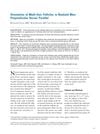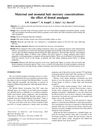
Glycyrrhizic acid and licorice extract can significantly reduce unwanted hair growth.

Keratin hydrogels from human hair show promise for tissue engineering and regenerative medicine.
 May 2006 in “Dermatologic Surgery”
May 2006 in “Dermatologic Surgery” Most nonbald men's multi-hair follicles are naturally positioned perpendicular to a line from the scalp's crown, which is important for natural-looking hair transplants.
 March 2003 in “BJOG: An International Journal of Obstetrics and Gynaecology”
March 2003 in “BJOG: An International Journal of Obstetrics and Gynaecology” Mothers and newborns with dental fillings have higher mercury in their hair, but adding fillings during pregnancy doesn't raise mercury levels further.
 September 2022 in “Frontiers in Bioengineering and Biotechnology”
September 2022 in “Frontiers in Bioengineering and Biotechnology” Taxifolin from Rhododendron mucronulatum may help prevent hair loss and promote hair growth.
 February 2021 in “International journal of men's social and community health”
February 2021 in “International journal of men's social and community health” Bald men's facial expressions are seen more negatively, and many men are dissatisfied with their bodies, including hair loss.
1 citations,
September 2022 in “Aesthetic Surgery Journal” April 2024 in “Journal of clinical medicine” Classical PCOS types A and B are most common and linked to higher health risks.
32 citations,
August 2016 in “Journal of the American Academy of Dermatology” Temporal triangular alopecia is a non-scarring hair loss in children, often linked to other health conditions.
 6 citations,
January 2018 in “PubMed”
6 citations,
January 2018 in “PubMed” Heavy metals might contribute to hair loss in Telogen Effluvium.
 3 citations,
July 2022 in “Dermatologic Therapy”
3 citations,
July 2022 in “Dermatologic Therapy” Magnesium microneedle patches can safely improve under-eye wrinkles when used every other night for 12 weeks.
 August 2024 in “Medicine”
August 2024 in “Medicine” Most patients with PCOS were prescribed medroxyprogesterone acetate or oral contraceptives, with some experiencing side effects or needing prescription changes.
November 2022 in “Frontiers in Medicine” Severe hair loss in Chinese men is linked to high blood pressure, while in women, it's linked to larger waist size and cholesterol issues.
405 citations,
January 2004 in “Journal of Investigative Dermatology” Hair follicle size and distribution vary significantly across different body sites.
75 citations,
September 2015 in “Acta biomaterialia” Alkylation of human hair keratin allows for adjustable drug release rates in hydrogels for medical use.
55 citations,
April 2015 in “BMC medicine” Stem Cell Educator therapy helps regrow hair and improve life quality in alopecia areata patients.
 46 citations,
April 2014 in “PLOS ONE”
46 citations,
April 2014 in “PLOS ONE” Gray hair may be caused by lower antioxidant activity in hair cells.
 44 citations,
May 2008 in “Fertility and Sterility”
44 citations,
May 2008 in “Fertility and Sterility” Insulin resistance might not be enough to worsen blood vessel function in young, nonobese women with polycystic ovary syndrome.
 24 citations,
January 2015 in “International Journal of Trichology”
24 citations,
January 2015 in “International Journal of Trichology” Early balding in young Indian men may indicate a higher risk of metabolic syndrome and potential heart disease.
 23 citations,
October 2021 in “Cell Stem Cell”
23 citations,
October 2021 in “Cell Stem Cell” Hair thinning causes stem cell loss through a process involving Piezo1, calcium, and TNF-α.
 16 citations,
July 2023 in “Acta biomaterialia”
16 citations,
July 2023 in “Acta biomaterialia” The study developed a new way to create hair-growing tissue that can help regenerate hair follicles and control hair growth direction.
 11 citations,
July 2022 in “Journal of Materials Science: Materials in Medicine”
11 citations,
July 2022 in “Journal of Materials Science: Materials in Medicine” A new hydrogel with stem cells from the human umbilical cord speeds up healing in diabetic wounds.
10 citations,
February 2022 in “Pharmaceuticals” Smaller curcumin nanocrystals penetrate skin and hair follicles better than larger ones.
 7 citations,
July 2022 in “Pharmaceutics”
7 citations,
July 2022 in “Pharmaceutics” The microneedle device with rapamycin and epigallocatechin gallate effectively promoted hair regrowth in mice.
6 citations,
March 2023 in “Materials” The GNP crosslinked scaffold with antibacterial coating is effective for rapid wound healing and infection prevention.
 5 citations,
June 2022 in “Frontiers in Endocrinology”
5 citations,
June 2022 in “Frontiers in Endocrinology” Research from 2011 to 2020 shows androgen receptors could be key for prognosis and treatment in certain breast cancers.
 5 citations,
December 2016 in “Journal of skin and stem cell”
5 citations,
December 2016 in “Journal of skin and stem cell” People with cutaneous Lichen Planus are more likely to have Metabolic Syndrome and related conditions like high cholesterol, diabetes, and high blood pressure.
 3 citations,
August 2020 in “Nutrition Journal”
3 citations,
August 2020 in “Nutrition Journal” Spinach-derived thylakoid supplements plus a low-calorie diet helped obese women with polycystic ovary syndrome lose weight and improve their metabolism.
2 citations,
April 2023 in “Polymers” The study created 3D-printed pills that effectively release a hair loss treatment drug over 24 hours.
 2 citations,
April 2023 in “Stem Cell Research & Therapy”
2 citations,
April 2023 in “Stem Cell Research & Therapy” Tiny fat-derived particles can help repair soft tissues by changing immune cell types.




















